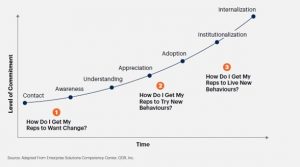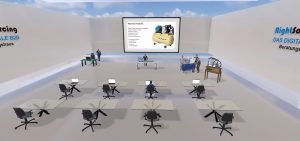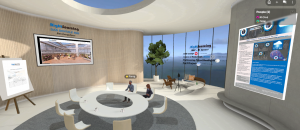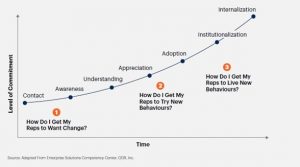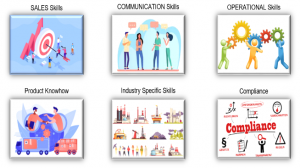- Article, English, RS Internal
- Suchi Shinde

Is Metaverse the future?
Due to the great interest and impact of Metaverse, Industrial Metaverse, Industrial Metaverse for Sales, etc., Rightsourcing continues with its series of articles to gain a deeper understanding of the topic. What does the metaverse really mean with all its facets? Is it just the next buzzword? Does it affect our life? How does it affect our life? Will it change our work? What must companies do? What is the best way to tackle this?
In the third article in this series, we will explore the question of whether Metaverse will just be a fad, or will it be the new way of connecting with customers and doing business? Given the expansive nature of the topic, we have divided it into two segments. In part – A, we will delve into the most recent developments in the Metaverse, and in the part – B, we will examine the major trends shaping our professional lives as a result of technological advancements.
To read Articles 1 and 2, please click on the links below.
1- What is the Metaverse?
2- What is the impact of the Metaverse on our lives?
– A contribution by Suchi Shinde & Parag Shinde, February 2023
The Metaverse, a virtual space where users can interact with each other and with digital objects in real time, is still in an early stage of development.
At the heart of much debate is whether the Metaverse will be a passing trend or the future of business relationships. Even among those familiar with the metaverse, there are doubters. /1/ However, as technology continues to advance and more and more people become familiar with the concept, other experts believe it has the potential to become an important part of our lives in both personal and business spheres in the future.
Metaverse is too big to ignore – but its future is far from certain.
LinkedIn founder and venture capitalist Reid Hoffman said in a recent Yahoo! Finance podcast: ‘It’s inevitable, but when and how is a crucial question… I still don’t see the signs that tell me the Metaverse is going to happen.”/2/
Let us dive deeper and review the latest happenings surrounding the Metaverse. This is how we can determine if the metaverse will be the next evolution for the internet or if it will disappear.
It is undoubtedly clear that Metaverse has the potential to revolutionize the way we interact, work, and play. However, there are still many challenges and obstacles that must be overcome in order for the metaverse to realize its full potential. These include issues related to privacy, security, and regulation, as well as the need for more advanced technology and infrastructure.
Sales estimates
The estimated market value of Metaverse activity as of June 2022 was between $200 billion and $300 billion. It is bigger now and in about eight years, it could be $4 trillion to $5 trillion (pictured below), roughly the size of Japan’s economy, and the third largest in the world. /3/
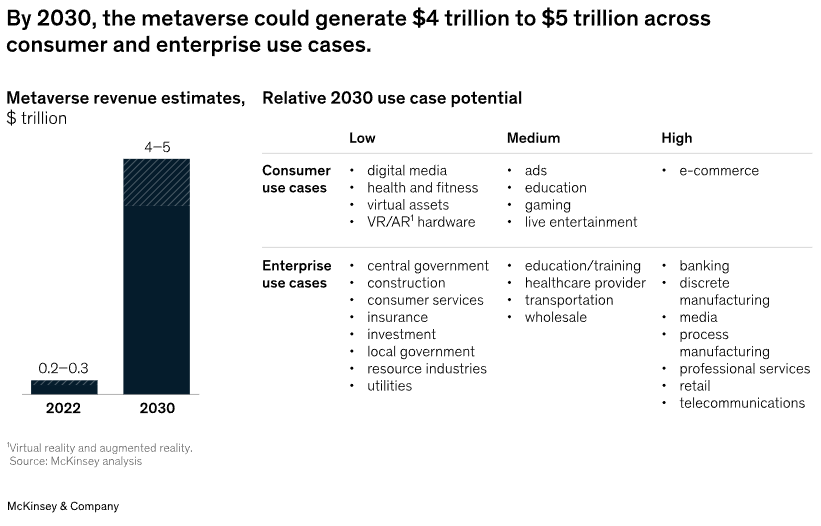
Figure 1 Metaverse sales estimates
Future technologies
Computing power improvements enable the creation of more detailed virtual worlds. The widespread adoption of 5G is also making it easier for users to access these worlds on mobile devices with faster speeds and lower latency. In addition, the cost of manufacturing hardware for augmented and virtual reality is decreasing, making it more accessible to a wider audience. /4/
Major investments in metaverse infrastructure
In 2021, Meta invested a significant amount of resources and money ($10 billion) in the development of the Metaverse. Roblox reported more than 58 million daily active users in 20221, while Fortnite had more than 20 million in 2020 and generated more than $9 billion in revenue between 2018 and 2019. This is a clear indication of the growing interest and investment in this technology by large tech companies. The Metaverse was a key focus at the Consumer Electronics Show, showing that it has become a hot topic in the tech industry. In addition, more and more companies, large and small, are showing interest in participating in the development and growth of the metaverse.
A wide range of use cases
The Metaverse is not just limited to gaming, its use cases are expanding to other areas of consumers and businesses. The Metaverse is used for immersive retail, entertainment, sports, and education experiences. Companies are also exploring enterprise applications such as virtual employee training and team collaboration with avatars, virtual prototyping in manufacturing and engineering, and virtual product showrooms. This diversification of use cases for the Metaverse helps it grow in popularity and attract more users. It offers companies new opportunities to innovate and improve their operations.
Widespread acceptance of online trading
Omnichannel commerce, the ability to shop and make purchases across multiple channels, is becoming increasingly common in the metaverse. Many Metaverse consumers are already familiar with this type of commerce, as payment information is often embedded in the devices and software they use. Additionally, the rise of cryptocurrencies makes it easier for users to set up and use cryptocurrency wallets within the metaverse, further streamlining the buying process. This integration of trading and payments within the metaverse makes it a more convenient and seamless experience for users.
Demographic Boost
The youngest members of Gen Z, in their mid-20s, are becoming a significant consumer force in the marketplace. They are more familiar with virtual worlds, online transactions, and digital goods than previous generations. This trend is particularly evident in gaming, where large segments of users are under the age of 16, such as 67% of Roblox’s 50 million daily users. This suggests the emergence of a new generation of Metaverse natives who grew up with virtual worlds and are comfortable navigating and engaging with them. This shift in demographics will likely continue to fuel the growth and development of the metaverse.
Influencer-led brand marketing
The trend towards individual content creators, also known as influencers, is becoming more and more popular on social media platforms. This is evident in the significant increase in influencer marketing over the past five years on platforms such as WeChat, YouTube, and Instagram in the western world. This shift toward individual content creators bodes well for the growth of the metaverse, as a significant proportion of innovative and engaging experiences are likely to come from these creators. Influencers bring a unique perspective and can create engaging and interactive experiences that attract a wide audience. They have a strong following and can drive more traffic and engagement to the Metaverse. This will likely lead to more growth and development of the metaverse and provide influencers with opportunities to reach new audiences and monetize their content.
Several factors have come together that could allow for exponential growth in the Metaverse. It appeals to people of different genders, locations, and ages. Consumers have shown a willingness to invest in Metaverse assets and are open to new technologies. Businesses are making significant investments in the necessary infrastructure, and brands that test the waters in the Metaverse find that their customers are delighted with the results.
Let’s continue to discuss the topic ‘Is Metaverse the future?’ in part B of this article. Here we will compare other Megatrends from the past to conclude this dilemma.
In the meanwhile, we urge you to visit our Metaverse offering for a taste of the future at https://rightsourcing-gmbh.com/metaverse-virtual-headquarter.
Stay tuned for our 4th Article in this series ‘Is Metaverse the future – part B’
References:
/1/ Aiello, C., Schmidt, J., Probing reality and myth in the metaverse, McKinsey & Company, June 13, 2022
/2/ shorturl.at/fxzCN (Reid Hoffman talks at yahoo! finance podcast)
/3/A CEO’s guide to the metaverse, Mckinsey Quarterly, January 24, 2023 – By Homayoun Hatami, Eric Hazan, Hamza Khan, and Kim Rants
/4/ Hazan, E., Kelly, G., Khan, H., Spillecke, D. et al. Marketing in the metaverse: An opportunity for innovation and experimentation, McKinsey Quarterly, May 24, 2022.
Rightsourcing Newsletter in Ihre Postfach. Melden Sie sich für unseren Newsletter an und Sie erhalten regelmäsig Updates in ihr Postfach. Natürlich können Sie ihn jedezeit abstellen.
Erhalten Sie die neuesten Updates zu Geschäftstrends und Technologie
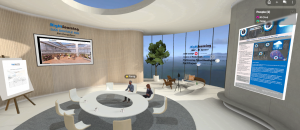
Digitale Transformation im Vertriebstraining: Auf dem Weg zur Selbstlernenden Organisation
Weiterlesen »